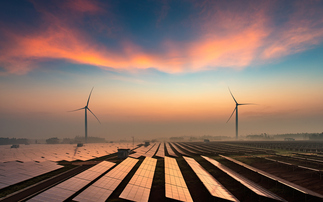More cash than ever before invested in climate finance in 2014, but unlocking future funds depends on better investment frameworks
Global climate finance hit a record-breaking $391bn in 2014, thanks to a surge in private investment in renewable energy, with investors were attracted by falling costs and improving technology.
According to a new study published today by the Climate Policy Initiative (CPI), public financing rose to $148bn in 2014 - an eight per cent increase on 2013 levels. But the real success story was the sudden surge of private money, with $243bn pouring into climate related projects in 2014, a 26 per cent increase on 2013.
Private investors concentrated funding on renewable energy, lured by falling deployment costs and supportive government policies, the report said. China was a major source of clean energy investment growth, accounting for 34 per cent of all private finance in 2014.
This is promising news for global efforts to prevent temperature rises. Rich countries have pledged to mobilise $100bn per year from 2020 to help poor countries cope with the worst impacts of climate change. But this figure is just a "starting point" to the overall investment needed to decarbonise the global economy on a two degrees pathway, according to Barbara Buchner, senior director of the CPI, and lead author of the study.
The total amount of investment required for climate mitigation and adaptation measures necessary to limit average global temperature increases to less than 2C far exceeds the internationally-agreed climate finance goal. More than $6tr annual investment is required for new low carbon infrastructure each year, according to The Global Commission on the Economy and Climate, while the UN's Environment Programme reckons a further $150bn a year needed by 2025 to help boost the climate resilience of existing infrastructure.
National governments have consistently argued there is a slim chance that all, or even most of this money will come from the public sector, and called on the private sector to plough billions of dollars into climate themed investments. That is why Buchner describes the 2014 surge in private investment as "very good news" - it's a sign that the frameworks are finally slotting in place to attract private investors to climate finance projects.
"There clearly is still a significant gap, but this year paints a really encouraging picture because we have seen a big increase from 2013," says Buchner. "And we are tracking money that's going into concrete projects, we are not tracking pledges for example - so we are really looking at financial investment on the ground.
Private investors tend to raise capital for projects in their own countries, where they are able to judge the risk potential and regulatory environment more accurately. As a result of the private investment surge, nearly three-quarters of all the climate investment was raised and spent in the same country, according to the report.
This is "encouraging" news, according to Buchner, who concludes countries are investing to drive their own economic growth and development.
However, this approach favours more developed countries, which tend to have more stable investment environments and public sector support to leverage business investments. Climate finance reporting standards - particularly in developing countries - is patchy. CPI could not identify where $56bn of climate finance (38 per cent of the total) was channelled to in 2014 - a result of inconsistent tracking and reporting habits across public and private investments.
Buchner hopes the upcoming Paris summit will provide an opportunity for countries to work together to develop more stable financial frameworks - both domestic and international - to attract investors.
"More could still be done in enhancing the transparency, comprehensiveness and consistency of climate finance data. There is still a need to enhance the tracking efforts, there is still not full transparency in accounting approaches, which makes it difficult to identify the entry points from finance can be scaled up," she says.
"Getting the domestic policy and support frameworks right is really critical for policymakers," she adds. "So we do hope there will be some more decisions on these issues in Paris."
So while the $100bn pledge may make a good headline figure during the two weeks of Paris, the real driver of change may be harder to spot. Falling technology costs, improved reporting standards, and stable policy frameworks may not be the sexiest of topics for the world's media, but they hold the key to driving private investment in climate finance - and creating global change.










